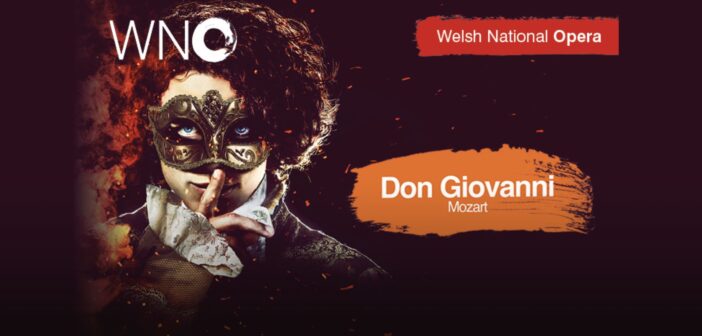The WNO production of Don Giovanni is a perfect first step into the world of opera, recommended for all.
-
8
In the Welsh National Opera’s production of Mozart’s Don Giovanni, no phrase rings truer than ‘hell hath no fury like a woman scorned‘. Don Giovanni follows Mozart’s tale of the 17th Century ‘sex-scapades’ of a seductive young noble with no moral compass, famed for bedding over two thousand women (often with dubious consent), leaving anger and heartbreak wherever he goes.
Opera is often renowned as being the most intimidating of the arts, and as wisely stated in the film Pretty Woman, “If they love it they’ll always love it. If they don’t, they may learn to appreciate it, but it will never become part of their soul.” Heading into the performance with an open and curious mind, accompanied by my much more informed opera-loving grandma as my guide and co-reviewer, Don Giovanni fast became an experience in which I learnt that Opera is in fact, something I now love.
The velvet curtains part and the stage is set to the scene of a candle-lit night on the ramparts of a villa, with elegant vocals filling the room as a couple rushes onto the balcony. In the dead of night, the lust filled Don Giovanni (Andrei Kymach) has entered the room of the young heiress Donna Anna (Marina Monzo) and raped her. As she cries for help, her father (James Platt) rushes to her aid but is cruelly murdered by Giovanni as he makes his escape, accompanied by his exasperated servant Leporello. We soon learn that Leporello (Simon Bailey) is no stranger to the Don’s wicked ways, and despite harbouring frustration and jealousy towards Giovanni’s womanising, he dutifully supports his master in continuing his crimes with a comedic flair.
The grieving Donna Anna and her betroved Don Ottavio (Kenneth Tarver) are now left in an engagement that is held tightly together by a vow to find and enact revenge on her fathers assassin. Don Giovanni is later pursued throughout the town by his enraged wife Donna Elvira (Meeta Raval) who has recently learnt of his affairs, and vows to not rest until the world knows of his crimes against women. Don Giovanni again seduces and rapes a young bride, Zerlina (Isabelle Peters), on her wedding day, and her infuriated cuckholded husband Massetto (James Atkinson) leads a collective of villagers and nobles who too seek his blood. From the very beginning, it is clear that revenge will be carried out on Don Giovanni, but by who remains the mystery that keeps the audience patiently waiting for his comeuppance.
Throughout the performance, it is the female vocalists whose voices shine through the most confidently, often with elegance, strength and anguish. Meeta Raval is an excellently expressive Donna Elvira, and the chaos that her character brings as her emotions fluctuate between longing and vengeful fury is as endearing as it is entertaining to watch. Zerlina and Massetto are well matched, whilst Don Ottavio and Donna Annas performances are powerful and beautifully interweaved with feelings of heartbreak and a desire to love again. Andrei Kymach gives a good performance as Don Giovanni, although at times Leporetto seemed to appear the more consistently vocally strong and engaging of the pair, especially during one scene in which Leporetto must impersonate Don Giovanni in an attempt to seduce Donna Elvira. From these descriptions, the web of love triangles and revenge plots may seem difficult to navigate, but the performance flows well and is supported by a set which relies on it’s lighting to set the scene, with large props only ever fluctuating between castle ramparts, heavy wooden doors, or rocks for the occasional outdoor setting. In my opinion, perhaps more could have been offered here in terms of creating a clear environment for its characters to exist in. The choreography of fight scenes also felt unconvincing or weakly carried out, making it hard to tell the difference between characters playfully swatting each other with props and when characters were truly injured by another.
This performance provides an intriguing insight towards the power structures and gender roles of bygone times, all tightly wound up in the god-fearing, sin avoiding contexts of Mozart’s time. I would confidently recommend to others as a good first step into Opera.



